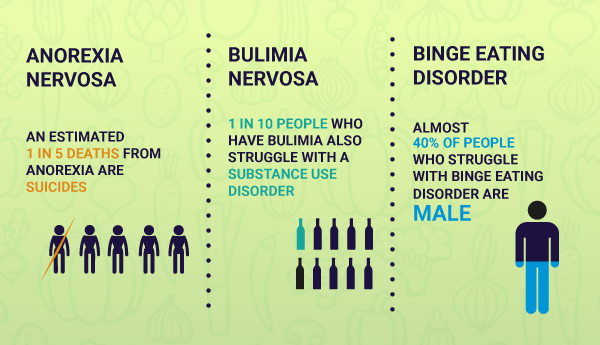10 Simple Techniques For Eating Disorder Recovery
Wiki Article
The Of Eating Disorder Recovery
Table of ContentsThe smart Trick of Eating Disorder Recovery That Nobody is Talking AboutWhat Does Eating Disorder Recovery Do?The Of Eating Disorder RecoveryEating Disorder Recovery Things To Know Before You Get ThisGet This Report about Eating Disorder Recovery

While numerous individuals make a point to be mindful of the components and sourcing of their food, orthorexia can end up being detrimental to the individual's health. At some point, certain foods or whole groups are eliminated from the person's diet regimen; they might additionally begin to consume over the ingredients in their foods, spending hours each day preparation dishes.
Food components might additionally end up being the individual's only topic of conversation. Orthorexia is likewise an usual co-occurring problem associated with OCD.
Some Known Factual Statements About Eating Disorder Recovery
With this disorder, an individual will purely prevent specific foods to the detriment of their wellness - eating disorder recovery. Unlike orthorexia, nevertheless, the avoidance of specific foods isn't driven by concepts of the food's healthfulness or purity, however instead by a severe aversion to the food's flavor, appearance, or odor (although worries concerning spoilage or food poisoning may likewise exist).Over time, an increasing number of foods become untenable, causing an incredibly limited scheme of acceptable foods. Previously known as careful eating disorder, ARFID often starts in youth as well as considerably worsens gradually. It's fairly common for youngsters to be "choosy eaters" and every person has preferences wherefore they consume, but if it ends up being uncontrollable and also harmful to a person's health and wellness, it requires a check-in with an eating disorder therapy specialist.
Likewise like orthorexia, an adverse or altered body picture is not necessarily a reason for the disorder. ARFID is generally dealt with utilizing talk therapy as well as cognitive retraining such as Cognitive Behavior Modification (CBT). Unlike a lot of eating conditions which normally first present throughout teenage years, rumination condition is most typical in early stage as well as very early childhood, although it can persist right into their adult years.
The 2-Minute Rule for Eating Disorder Recovery
Usually, they do not experience tension or disgust when regurgitating, neither do they show up to make an initiative to vomit (as seen in bulimia nervosa). Rumination problem is often a response to an irrational fear of ailment triggered by consuming, although its reasons are much less well-understood than other eating problems.

While numerous individuals make a factor to be aware of the active ingredients as well as sourcing of their food, orthorexia can end up being detrimental to the individual's wellness. Eventually, particular foods or whole groups are gotten rid of from the individual's diet; they could additionally start to stress over the ingredients in their foods, investing hours each day preparation meals.
go to this site
Indicators on Eating Disorder Recovery You Need To Know
With this disorder, a person will purely prevent particular foods to the hinderance of their wellness. Unlike orthorexia, nevertheless, the evasion of particular foods isn't driven by notions of the food's healthiness or pureness, yet rather by a serious hostility to the food's taste, structure, or smell (although problems concerning spoilage or gastrointestinal disorder may also be present).
In time, a growing number of foods become untenable, causing an extremely restricted combination of appropriate foods. Formerly referred to as selective eating condition, ARFID frequently begins in youth and gradually aggravates gradually. It's reasonably typical for kids to be "particular eaters" and everybody has preferences wherefore they eat, yet if it comes to be uncontrollable as well as harmful to an individual's health, it necessitates a check-in with an eating disorder treatment professional.
Everything about Eating Disorder Recovery
Likewise like orthorexia, an unfavorable or altered body photo is not always a source of the problem. ARFID is typically treated using talk treatment as well as cognitive re-training such as Cognitive Behavior Therapy (CBT). Unlike many eating disorders which normally first existing during teenage years, rumination disorder is most usual in infancy and very early childhood, although it can linger right into adulthood.Generally, they do not experience tension or disgust when spewing, nor do they show up to make an initiative to vomit (as seen in bulimia nervosa). Rumination problem is often a response to an irrational fear of disease triggered by consuming, although its reasons are much less well-understood than other eating conditions.
Rumination disorder is noted in the try this DSM-V. Diabulimia is provided her explanation as one of the many unspecified consuming conditions under the catchall term OSFED (Various other Specified Feeding r Eating Disorder).
Report this wiki page